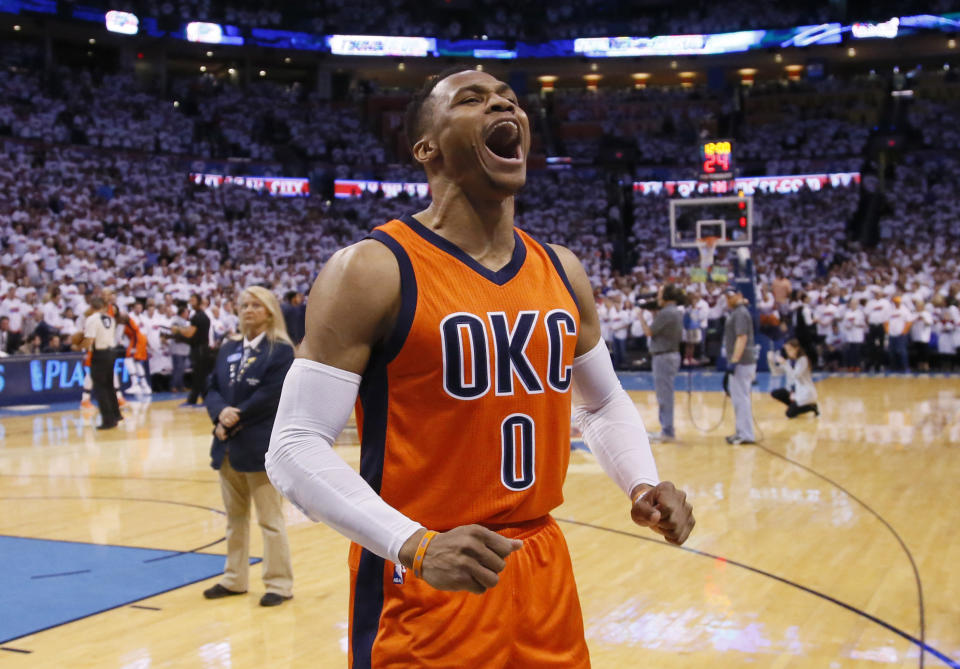Why the NBA's super-team era could cripple small-market franchises
Any day now, Russell Westbrook could wake up and decide he wants to sign the richest deal in NBA history. Oklahoma City stands willing to give Westbrook an estimated five-year, $207 million extension which, coupled with the $28.7 million Westbrook will make next season, will guarantee Westbrook nearly a quarter of a billion dollars — while tying him to the Thunder through 2023.
As general manager Sam Presti said last month, “I wouldn’t really say that one is a negotiation.”
The stakes for Oklahoma City are enormous. Sign Westbrook, and the Thunder, at a minimum, have a bona fide franchise player, one who will have a year to convince another, Paul George, to stick around. It’s very possible. Westbrook has been unflinchingly loyal to Oklahoma City, and George has been adamant that winning is his top priority.
If Westbrook elects to test free agency, Oklahoma City faces the staggering reality of losing three top-five players (Westbrook, Kevin Durant, James Harden) in six years and another (George) widely considered top-15. It would be an unprecedented talent drain and a crippling blow to a well-run franchise.
Yet there is a potentially bigger issue. The health of small-market teams has rarely been so tenuous. Two small-market playoff teams (Utah, Indiana) suffered devastating losses this summer. Another (Cleveland) could be thrust into a rebuild if LeBron James defects next summer. Anthony Davis told reporters this week he was happy in New Orleans, but the Pelicans could be one more rough season away from having to explore trading Davis — or risk losing him for nothing in 2020.

For years, the NBA built a strategy to protect small-market teams around one asset: money. The system incentivized players staying put with more lucrative max-level contracts than what they could receive from another team, along with sweeteners like designated player exception deals that could tack on millions more. It was a reasonable approach, which coupled with harsh luxury-tax penalties, was designed to ensure competitive balance.
It hasn’t. The NBA has never really known true parity; since 1947, just 19 teams have won the NBA championship. Yet the league has never been so top-heavy, with many team officials believing catastrophic injuries are the only thing that can stop Golden State from rattling off two or three more championship seasons.
Long term, Golden State isn’t the issue. It’s who comes next.
Free-agent stars clustering, which began in earnest in Miami and was taken to another level when Durant joined a 73-win Warriors team, is unlikely to end with Golden State. Why? Because money, at least in the form of maximum long-term security, has become increasingly less important. Star players, many of who have already earned in excess of $100 million by the time they hit free agency and some of whom have endorsement deals that dwarf their NBA salaries, are less motivated to reach for the max possible dollar.
David West isn’t a superstar. Yet in 2015, West, having earned nearly $90 million to that point, opted out of the final year of his contract with Indiana, leaving $12.6 million on the table to sign a one-year, $1.4 million deal with San Antonio. West believes players’ desire to play in meaningful games is causing them to look for the best opportunity — and be willing to take less money to do it.
“When you get older and you get opportunities to give yourself a better chance to win, guys are going after it now,” West told The Vertical. “I think also the last couple of years, [with] collective bargaining, the length of contracts have gone down. It’s given guys more flexibility. You don’t have guys tied into five- [or] six-year deals anymore. Guys are looking at two-, three-, four-year deals, and with opt-outs, they are looking at it and saying, ‘If I could take $5 million less,’ or whatever it is for a game to mean something every night, they are doing it. It’s the way things have shaped up the last few years.”
And as stars look to join forces, small-market teams know the likelihood of them clustering there is slim. The summer of 2018 could be a small-market disaster. Westbrook and George could flee Oklahoma City, leaving the Thunder in ruins. James could leave Cleveland. Memphis is clinging to playoff contender status. Sacramento is in the early stages of a full rebuild. Of the bottom third NBA television markets, only three (San Antonio, Portland, Milwaukee) could be competitive.
It’s a problem with no solution. If players are willing to walk away from long-term security, the NBA is powerless. If stars are willing to shave millions off their annual salaries, there is little the league can do about it.
The decade began with Miami’s super team and will likely end with Golden State’s. In two years Kyrie Irving, at 27 and with $100 million in career earnings in his pocket, will be able to handpick his next location. In three years, Davis could do the same.
Where is the next super team? Wherever the players decide to create one.
More NBA coverage from The Vertical:


